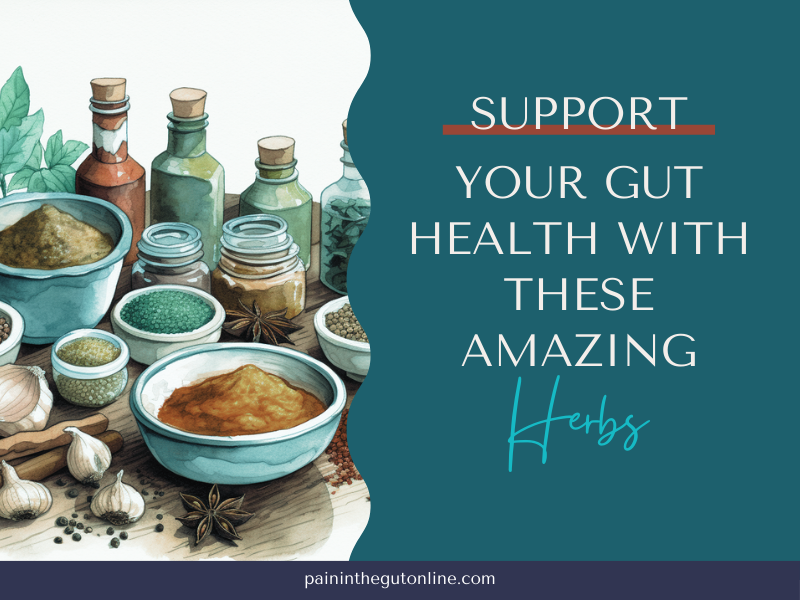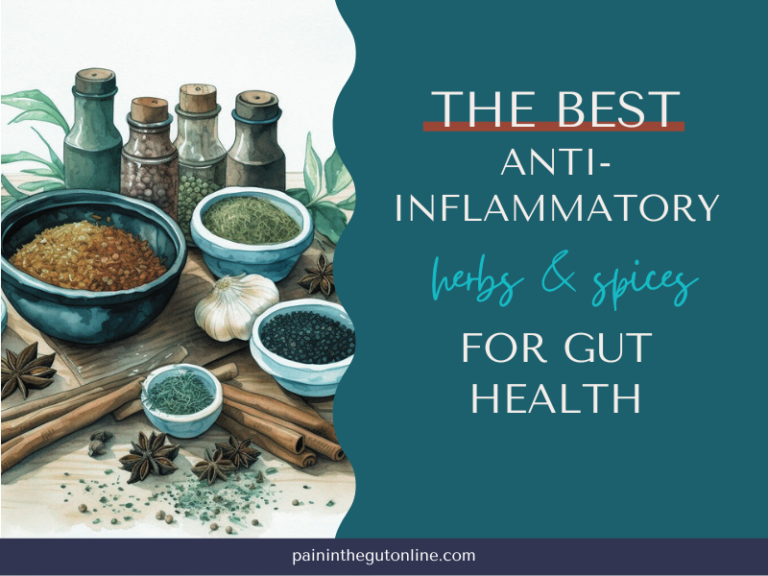ANTI-INFLAMMATORY HERBS
5 min read/ 1,115 words
Discover the power of anti-inflammatory herbs for gut health after 40. Turmeric, ginger, and green tea to the rescue!

Table of Contents
Anti-Inflammatory Herbs for Gut Health
If you’re looking for natural ways to support your gut health and reduce inflammation, adding these inflammation-fighting herbs to your diet can help. Curcumin and ginger, two herbs in particular, have gained attention for their anti-inflammatory properties.
Curcumin’s Anti-Inflammatory Benefits
Curcumin, a chemical found in turmeric, is known for its potent anti-inflammatory properties. It has been extensively studied for its potential to reduce inflammation, especially in conditions like arthritis.
Curcumin works by inhibiting specific molecules that play a role in inflammation, helping to alleviate symptoms and promote gut health.
While more research is needed to fully understand curcumin’s impact on gut health, studies have shown promising results. Curcumin has shown potential in reducing inflammation in conditions like inflammatory bowel disease, but further investigation is ongoing (Medical News Today).
Incorporating turmeric, either as a spice in your meals or in supplement form, may help support gut health and reduce inflammation.
Ginger’s Soothing Properties
Ginger is another herb that has been recognized for its anti-inflammatory properties.
It contains several active compounds, such as gingerol, shogaol, zingiberene, and zingerone, which contribute to its health benefits, including its ability to reduce inflammation (Healthline).
Research suggests that ginger can help limit the production of cytokines, which are molecules involved in inflammation, and inhibit the activity of enzymes that promote inflammation. This makes ginger a potentially valuable herb for supporting gut health and managing inflammatory conditions.
In a meta-analysis of 16 studies, it was found that taking 1,000-3,000 mg of ginger daily over 4-12 weeks significantly reduced markers of inflammation compared to a placebo (Healthline).
Incorporating ginger into your diet by adding it to meals, drinking ginger tea, or using it in powdered form can be a flavorful way to support gut health and reduce inflammation.
It’s important to note that while turmeric, ginger, and green tea are generally considered safe, according to the National Center for Complementary and Integrative Health, there may be potential side effects and interactions with certain medications. It is advisable to consult with your healthcare provider before incorporating these herbs into your routine, especially if you are taking any medications or have underlying health conditions (Medical News Today).
By utilizing the anti-inflammatory benefits of curcumin and ginger, you can take a natural approach to support your gut health and ensure your body’s overall well-being.
Remember, these herbs can complement a healthy lifestyle and a balanced diet, but it is always best to seek professional advice for personalized recommendations.
Impact of Green Tea
Green tea, known for its numerous health benefits, also supports gut health and reduces inflammation. Let’s explore the impact of green tea on gut health and its anti-inflammatory effects.
Anti-Inflammatory Effects
Green tea possesses anti-inflammatory properties that can help disrupt processes causing inflammation, making it a valuable addition to an anti-inflammatory regimen.
In conditions such as arthritis, where chronic inflammation is a concern, green tea’s anti-inflammatory effects can reduce inflammation and provide relief.
Research suggests that the polyphenols in green tea, mainly a catechin called epigallocatechin gallate (EGCG), contribute to its anti-inflammatory properties. These compounds help modulate the body’s inflammatory response, potentially reducing inflammation and its associated symptoms (Healthline).
Metabolic Disorders and Inflammation
In addition to its anti-inflammatory effects, green tea may also have a positive impact on inflammation in individuals with metabolic disorders.
Studies indicate that green tea can help reduce inflammation in conditions such as metabolic syndrome and type 2 diabetes. Green tea may contribute to improved metabolic health by targeting the underlying inflammation.
The specific mechanisms through which green tea exerts its anti-inflammatory effects in metabolic disorders are still being investigated. However, the polyphenols and antioxidants in green tea are believed to play a role in reducing inflammation and oxidative stress, both of which are associated with metabolic disorders.
Incorporating green tea into your diet may support your gut health and help manage inflammation related to arthritis and metabolic disorders.
However, it’s important to remember that green tea should not replace medical advice or treatment. If you have any specific health concerns, consult with a healthcare professional.
To learn more about gut health and inflammation and how to support your gut through dietary choices, check out our articles on gut health and inflammation, anti-inflammatory diet for gut health, and anti-inflammatory foods for gut health.
Natural Remedies for Gut Inflammation
When it comes to supporting gut health and reducing inflammation, natural remedies can play a significant role. Let’s explore the benefits of three potent anti-inflammatory herbs: turmeric, ginger, and green tea.
Turmeric, Ginger, and Green Tea Benefits
Turmeric contains curcumin, a chemical compound renowned for its anti-inflammatory properties. Studies have shown that curcumin can reduce inflammation in conditions like arthritis and may have potential benefits for individuals with inflammatory bowel disease. Incorporating turmeric into your diet or taking curcumin supplements can be a useful strategy to support gut health and combat inflammation.
Ginger is another powerful herb with anti-inflammatory properties. It contains constituents that can limit the production of cytokines and the activity of enzymes promoting inflammation. Research suggests that ginger may be beneficial in treating conditions like arthritis and pain. Adding ginger to your meals or enjoying ginger tea can help soothe inflammation and support gut health.
Green tea is well-known for its health benefits, including its anti-inflammatory properties. Green tea contains compounds that can disrupt processes leading to inflammation, making it a valuable asset for individuals with metabolic disorders and those seeking to reduce inflammation. Drinking green tea regularly can be a delightful way to incorporate this anti-inflammatory herb into your routine.
These herbs can easily be integrated into your daily life.
Turmeric can be added to various dishes, while ginger can be used in cooking or enjoyed as a soothing tea. Green tea is a refreshing beverage that can be consumed hot or cold. Including these herbs in your diet can provide natural support for gut health and help alleviate inflammation.
Potential Side Effects and Interactions
Using natural remedies like anti-inflammatory herbs, turmeric, ginger, and green tea can support your gut health and reduce inflammation. These herbs offer a holistic approach to wellness and have been utilized for centuries for their healing properties.
Remember to consult with your healthcare provider and consider incorporating these herbs into your routine to promote a healthy gut. For more information on herbs that can benefit gut health, check out our article on anti-inflammatory herbs for gut health.
If you’d like a done-for-you meal plan that helps you easily incorporate these herbs into your diet, grab our 30-Day Anti-Inflammatory Meal Plan – Learn more here.




